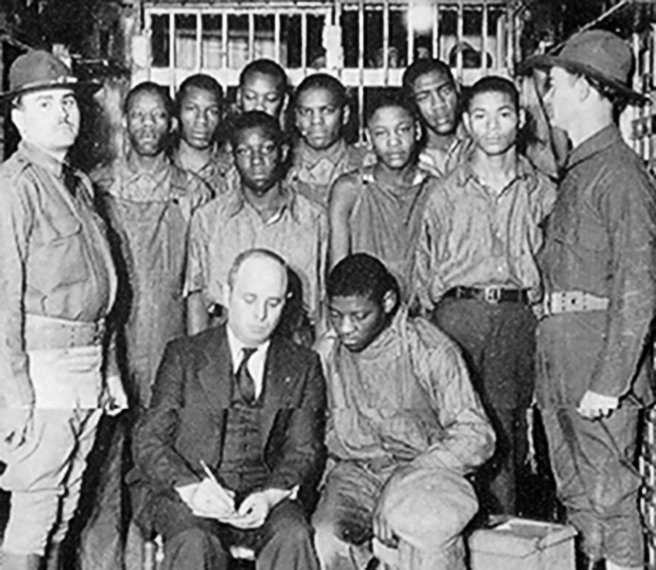

The nine Black teens, aged 12 to 18 — Haywood Patterson, Roy Wright, Andy Wright, Charlie Weems, Clarence Norris, Ozzie Powell, Willie Roberson, Olen Montgomery and Eugene Williams, (not named in order) meeting with their lawyer, attorney Samuel Leibowitz in 1931.Photo: Fred Hiroshige


The nine Black teens, aged 12 to 18 — Haywood Patterson, Roy Wright, Andy Wright, Charlie Weems, Clarence Norris, Ozzie Powell, Willie Roberson, Olen Montgomery and Eugene Williams, (not named in order) meeting with their lawyer, attorney Samuel Leibowitz in 1931.
Photo: Fred Hiroshige
Eighty-two years after their arrests, the last three of the innocent “Scottsboro Boys,” Charles Weems, Andy Wright and Haywood Patterson, were posthumously exonerated by the state of Alabama. On Nov. 21, the long-overdue pardons, although merely symbolic gestures, were officially granted.
In this case, “better late than never” amounts to “justice delayed is justice denied.” The exonerations resulted from recently passed legislation in Alabama aimed at this case, which allowed its Board of Pardons and Paroles to issue pardons in old cases.
On March 25, 1931, nine Black teens — Haywood Patterson, Roy Wright, Andy Wright, Charlie Weems, Clarence Norris, Ozzie Powell, Willie Roberson, Olen Montgomery and Eugene Williams, aged 12 to 18 — were arrested. They became known then as the “Scottsboro Boys.”
The youth were riding a “hobo” freight train seeking jobs. Several white men began fighting with them. The train operator signaled ahead that there was trouble. When the train pulled into the small rural town of Scottsboro, Ala., the youth were arrested. An armed white mob awaited them, and later that evening a lynch mob of hundreds of whites surrounded the jail.
Two young white women passengers, Victoria Price and Ruby Bates, accused the teens of gang-raping them at gunpoint. They concocted this story to avoid being arrested themselves on various charges. Bates later recanted her statement and asked for forgiveness. She then traveled the country with Communist Party representatives pleading for justice for the Scottsboro youth.
During nearly a century of legal segregation in the U.S., “justice” for Black males who were accused or suspected of raping a white woman resulted in physical lynching or legal lynching through the death penalty.
Because accusations of rape of white women, particularly by Black men, is such a volatile issue, the NAACP was reluctant to represent the youth in 1931. However, CP attorneys took on the case; they hired and assisted Samuel Leibowitz, a criminal attorney from New York, to represent the nine defendants.
Their initial trial began just 12 days after their arrests, and lasted less than two weeks. Juries then were all white, as Blacks were systematically excluded from jury rolls in violation of equal protection rights under the Constitution. Defendants were presumed guilty until proven innocent beyond a reasonable doubt.
Racism dominated; truth was ignored
All of the teens were automatically indicted, convicted of all charges and sentenced to death by hanging. No evidence was found linking any of the youth to the two women, because the rapes never occurred. They were targets for racial hatred, in the wrong place at the wrong time in a white-supremacist society. The nine were victims of a racist legal system with built-in structures of inequality.
Two years later, the guilty verdict was set aside and a new trial was ordered. The new jury quickly returned a guilty verdict and the death sentence. On appeal to the U.S. Supreme Court, the convictions were overturned and new trials ordered. Between the two trials the teens were held on death row.
In 1937, four of the youth were acquitted of all charges. The four remaining, Patterson, Norris, Andy Wright and Weems, who served 12 years in prison, were paroled in 1946, after having been sentenced to 75, 99, 105 years and death, respectively. In total, the Scottsboro nine were found guilty in three separate trials. Their cases went to the Supreme Court twice. Eventually, all death sentences were set aside.
All of them were out of prison by 1950. Their struggles for justice, and their nearly two-decades-long battle for civil rights were devastating. Beginning with their arrests, their lives were in danger.
The Scottsboro case is a precursor to the Civil Rights Movement. Following the hardships the youth were forced to endure, their re-entry into an oppressive, racist world made adjusting extremely difficult. They mostly led turbulent lives after release and lived in fear.
Andy Wright was jailed again after violating parole, then paroled again to New York. Patterson escaped prison in 1948 and fled to Michigan. He was located and arrested by the FBI. But Gov. G. Mennen Williams refused to extradite him to Alabama, pressured by a letter-writing campaign. Unfortunately, Patterson died of cancer in prison while serving time on a manslaughter charge.
While out of jail, Patterson co-wrote his autobiography, “Scottsboro Boy: The Story that America Wanted to Forget,” which was published in 1950. In 1979, Norris’ co-written autobiography, ”The Last of the Scottsboro Boys,” was published. He died in 1989.
This harrowing case resulted in landmark civil rights decisions regarding automatic death penalty sentences for Black men in Alabama convicted of raping white women, and on teens being tried as adults.
None of the “Scottsboro Boys” ever received an apology or financial restitution from the state of Alabama for their unlawful arrests, convictions and imprisonments.
Africa is rising, the days of colonialism are finished: This is the call being echoed…
Several immigrant groups and their supporters rallied outside the federal courthouse in Philadelphia on May…
Thousands of construction workers and teachers in at least seven provinces throughout Panamá took to…
El imperialismo estadounidense sufrió su segunda derrota histórica el 30 de abril de 1975 a…
As part of Workers World newspaper’s coverage marking the 50th anniversary of the liberation of…
From the PFLP Central Media Office The following statement from the Popular Front for the…